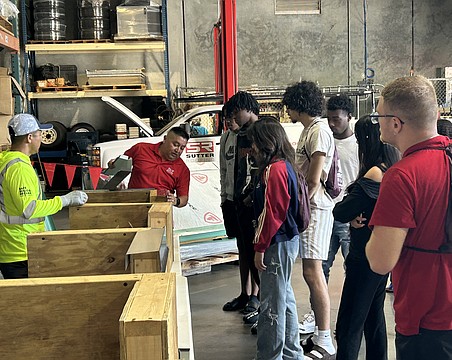REVIEW SUMMARY
Company. Cinnabar Ventures
Industry. Technology
Key. Combine speed and people to corner a market.
That server in the closet may soon be a thing of the past.
Companies spend fortunes maintaining computers and servers to store data with staff to fix all sorts of hardware and software glitches. But Richard Granville is betting your company is better off without all that hassle and expense.
Granville, 40, suggests companies get on his “cloud,” off-site servers that contain any software applications your company needs or data you need to store. Employees can work by accessing the cloud using Internet devices such as inexpensive “netbooks” or mobile phones. Granville will even rent you Internet-only laptop computers to use for a small monthly fee and he'll replace them if they break.
Cloud computing isn't really that new. In fact, if you use Gmail, you are using Google's cloud to send, store and receive email, for example.
But the excitement in the tech world is the possibility that companies and other organizations might work solely off of Internet-based applications and store data there. Armed with a cheap netbook (an Internet-only laptop computer) or mobile phone, there's no need for expensive desktop computers, a closet full of servers or even IT employees.
“Everything's going mobile,” Granville says. “Hardwire is a thing of the past.”
Giants of the industry such as Google, Microsoft and IBM are already hard at work designing clouds. But Granville says none of these competitors offer hardware, fiber connections, data management, software and content together.
For example, within a year, Granville's company, Fort Myers-based Cinnabar Ventures, plans to offer everything from low-cost netbooks to fiber connections and exclusive content to users.
“Software is the glue that holds it together,” says Granville, who says he already has invested $8 million with two family friends.
Hire the best
The Miami-born Granville isn't a neophyte to the telecom world.
He built Avana Communications, an Atlanta telecom company that became the nation's second-largest regional Internet service provider. In 2000, Granville retired to the Fort Myers area at age 30, just before the telecom bust. “I walked away with eight figures,” he says.
But Granville plans to build Cinnabar in a different way. “At Avana, I was a micromanager,” he says. His philosophy this time: “Surround yourself with people who are better than you are.”
Indeed, two technology veterans from giant semiconductor manufacturer Advanced Micro Devices have moved into Cinnabar's top ranks in recent months. They include Linda Starr, 52, former corporate vice president and chief sales strategist for AMD, and Richard Lisa, 51, former vice president of field sales for the chipmaker. Starr is now chairman of Cinnabar and Lisa is president and chief operating officer. Granville, Cinnabar's largest shareholder, is chief executive officer.
“It's the new industry,” says Lisa. “Between 2010 and 2015, over 15 billion Internet appliances will be deployed in the world.” All these Internet devices will be connected to various clouds, either open to the public or limited to specific users.
Cinnabar is investing heavily in people and acquisitions. In addition to stock grants, Lisa will earn $350,000 in base salary the first year, then $600,000 annually through the rest of his five-year contract, according to public filings.
Cinnabar recently completed the acquisition of US Metropolitan Telecom for $18 million, a Bonita Springs telecom company headed by Frank Mambuca. Mambuca is former group vice president of global operations for Level 3
Communications, the company that built the Internet backbone that carries Internet traffic between the U.S. and Europe. Mambuca oversaw the laying of the giant fiber-optic cable across the Atlantic Ocean in the 1990s.
From Fort Myers, Cinnabar will use US Metro's strength to build fiber links for businesses to its cloud in six other major markets, including Atlanta, the New York City area and Chicago.
Fast to market
With rivals racing to offer cloud computing, Granville says he's in a hurry to build his company. He acquired Cinnabar for $200,000, a publicly traded company (symbol: CNBR; recent stock price: $2.60) that had previously been involved in mining but was sold to him as a shell.
Buying a shell company gave Granville a head start of as long as 18 months because it can take that long to obtain regulatory approval for a new publicly traded company. He's planning to raise $10 million in a secondary offering underwritten by Scottsdale Capital Advisors. “We don't have 12 to 18 months to wait,” Granville says.
While he might have been able to raise money faster with venture funding, Granville says entrepreneurs lose control of their company. Granville owns 75% of Cinnabar today and the company has no debt (the market capitalization of the company recently was valued at $48 million.)
Granville says with the recent US Metro acquisition that Cinnabar now has about 50 employees. The employee count could triple in the next year to 18 months.
There's a lot to do. Cinnabar has to design clouds for customers, provide content, write software that businesses can use and manufacture hardware. “We're working with companies in Korea and China to make private-label devices,” Granville says.
Cinnabar already has developed the platform for its Web-based operating system called Yippy, which it is currently testing on the company's Web site, Yippy.com.
This cloud is designed for children whose parents want to control what they see or search online. Parents can customize what their children search for on the Internet, what videos they watch, the games they play or the music they listen to. Granville says he hopes the cloud has 1 million users this year.
With such a captive audience, Cinnabar plans to sell advertising.
Cinnabar knows who its customers are and can provide advertisers with demographic and geographic information. Granville estimates advertising will account for between 25% and 30% of revenues, which he forecasts could reach
$15 million this year (the company had no revenues in 2009).
Clouds designed for businesses will be built with the same idea in mind: the customer can decide what employees have access to while they're working in the cloud. The trick is to build and maintain clouds without having to hire an army of techies, which is where Cinnabar says its software excels.
“You have to build economies of scale in every part of the business,” Granville says. “Our platform is self-managing.”
Access to a cloud might cost about $10 per user, per month and Cinnabar plans to lease Internet-only laptops for about $30 a month. Granville estimates that companies can save up to 50% off their information-technology equipment and labor budget by moving everything to a cloud. “Business owners are looking for one person to call,” Granville says.
Granville says he can undercut competitors because the cost of everything from telecom equipment to real estate is so much less expensive than it was during the boom a few years ago.
“It's the perfect time to start a business,” he says.
Jean Gruss covers the Lee-Collier region. He can be reached at [email protected], or at 239-415-4422.






